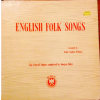The Ravishing Music of Ralph Vaughan Williams, Good for the Holidays and all Through the Year
 My wife and I don’t listen to the music of Ralph Vaughan Williams (1872-1958) only during Christmas season, though this is a particularly good time to do so, since a great deal of his output is connected to the annual fest. In fact, on Dec 25th 2013, I shared about the British composer in this appreciative post. Over a prodigiously productive career that included nine symphonies, RVW discovered and wrote a banquet of ravishing choral music, folksong cycles, smaller chamber and symphonic works, and more, lots of it in the idiom of British folk melodies, much of which he gathered and notated in the field from nonprofessional musicians and singers, while also traveling with early recording equipment, which he used to gather direct sound.
My wife and I don’t listen to the music of Ralph Vaughan Williams (1872-1958) only during Christmas season, though this is a particularly good time to do so, since a great deal of his output is connected to the annual fest. In fact, on Dec 25th 2013, I shared about the British composer in this appreciative post. Over a prodigiously productive career that included nine symphonies, RVW discovered and wrote a banquet of ravishing choral music, folksong cycles, smaller chamber and symphonic works, and more, lots of it in the idiom of British folk melodies, much of which he gathered and notated in the field from nonprofessional musicians and singers, while also traveling with early recording equipment, which he used to gather direct sound.
In the early decades of the twentieth century there were other song collectors doing similar work in Britain (Cecil Sharp and others) and in North America (Alan Lomax, John Cohen). And, twentieth century composers in other lands were also fascinated with borrowing from indigenous musics, like Sibelius did in Finland, Smetana in Hungary, Copland in America, etc. I’ve always been most fond of RVW among this ilk because—though my ethnic roots are all in Eastern Europe—I’m a never-closeted Anglophile, a fan of Gaelic cultures and lover of the highlands and the North, regardless of country and continent. Vaughan Williams also composed modernist, often challenging music, like his Sixth Symphony which includes a passage for saxophone, so to me he never became saccharine or merely stuck in the past. I have many precious LPs of RVW’s, several vinyl sides of which I bought secondhand on my first visit to Britain in 1980 (one of which is pictured here), but this year our turntable is on the fritz, so I’ve gone searching for his music on youtube, and thankfully, I’ve found a very productive rabbit hole over there, just using the search term ‘Ralph Vaughan Williams songs voice‘. One piece in particular that we adore is “Five Variants of ‘Dives and Lazarus,'” from a New Testament source, which I’ve found in an orchestral version and a version sung by Maddy Prior, longtime member of the British folk revival group of the 1970s, still going strong, Steeleye Span. In the sung version, I appreciate the combination of lyrics oriented toward the sacred, and those about meat and drink and other earthly pleasures. At this link, you may listen to the orchestral version and prepare to have your ears caressed for 13 minutes, and follow the suspense of the biblical tale in the sung version.





